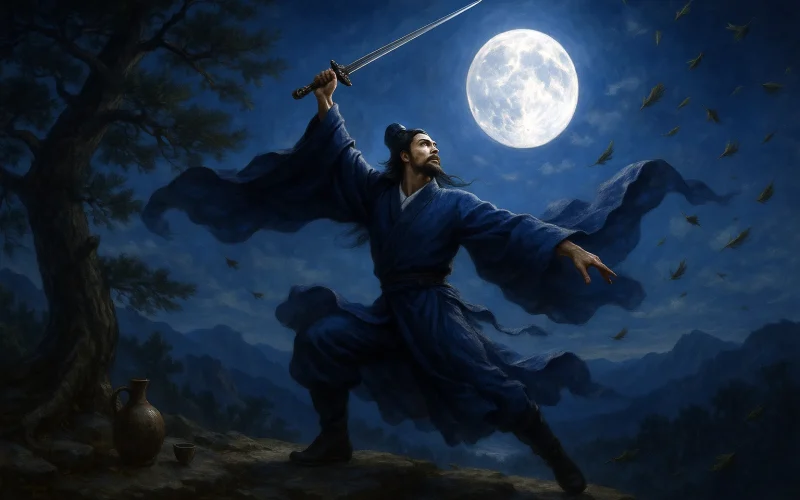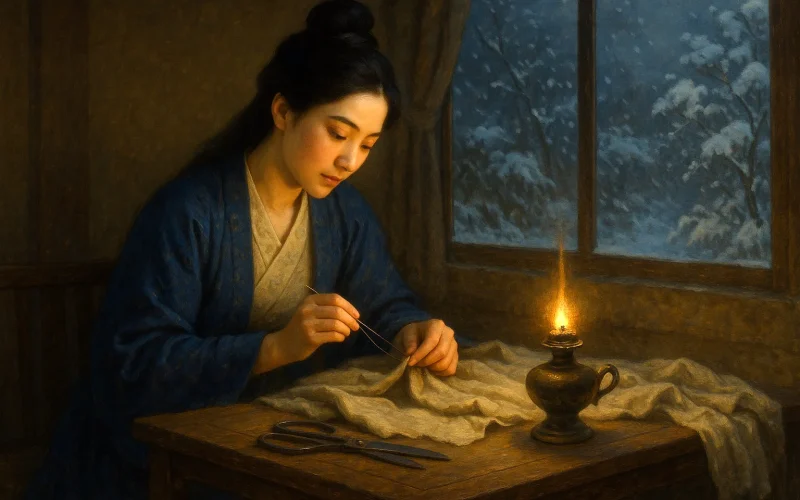I love the joy of Mount Tongguan so deep
That I won’t go home in a thousand years.
I’d like to turn my sleeves while dancing a leap
And sweep the five peaks clean with my song sincere.
Original Poem
「铜官山醉后绝句」
李白
我爱铜官乐,千年未拟还。
应须回舞袖,拂尽五松山。
Interpretation
Composed in 754 CE during Li Bai's travels to Tongguan Mountain in southern Xuancheng, this quatrain was written exactly a decade after his dismissal from court. Now in his fifties with ambitions unfulfilled, the poet channeled his disappointment into a passionate embrace of nature, creating this crystallized expression of finding spiritual solace in landscape—a transformation of worldly frustration into transcendent devotion.
First Couplet: "我爱铜官乐,千年未拟还。"
Wǒ ài tóng guān lè, qiānnián wèi nǐ huán.
I love Tongguan's joy so deep, Not returning in a thousand years I'd keep.
The opening bursts with unreserved declaration. "Love" dominates the poem with passionate intensity. "Tongguan's joy" encompasses both landscape's delight and unrestrained life with wine and companions. "Not returning in a thousand years" shocks with hyperbole—its temporal absoluteness and resolute tone announce complete break from officialdom, elevating temporary pleasure to eternal spiritual choice.
Second Couplet: "应须回舞袖,拂尽五松山。"
Yīng xū huí wǔ xiù, fú jìn wǔ sōng shān.
I'll swirl my dancing sleeves wide, To caress Five Pine Mountain's side.
This couplet transforms passion into fantastical motion. "Swirl my dancing sleeves" continues Li Bai's iconic drunken persona—both literal intoxication and his soul's unrestrained dance. "Caress the mountain" is inspired, treating sleeves as paintbrushes and landscape as canvas, embracing the mountain through drunken dance. This shows extreme affection becoming poetic conquest, embodying romantic unity with nature.
Holistic Appreciation
The poem's artistic distinction lies in expressing resolute detachment through passionate positivity. The poet voices no disgust for Chang'an, only love for Tongguan; no refusal to return, only "no plans to return." Political frustration transforms into ecstatic celebration of freedom. In four compact lines, emotion swells with tension: the first couplet declares like cast metal; the second imagines like floating fairies' ribbons. Behind drunken exuberance lies a genius poet's loneliness in worldly misfit, and his solemn effort to build an independent kingdom in landscape and wine.
Artistic Merits
- Extreme Emotional Expression: "Thousand years," "no plans to return," and "caress completely" push personal feeling to limits, creating strong artistic impact.
- Romantic Self-Image Crafting: The "swirling sleeves" image shapes the poet into a drunken immortal dancing with landscape, highly visual and iconic.
- Reality-Fantasy Fusion: The first couplet directly expresses emotion (real); the second depicts drunken gesture (fantasy)—mutually enhancing to create dreamlike poetic space.
- Condensed yet Weighty Language: Twenty characters contain emotional outburst, declaration of intent, and behavioral imagination, demonstrating Li Bai's linguistic mastery.
Insights
This poem exemplifies profound spiritual self-renewal. When avenues in the external world (such as official careers) close, Li Bai transcends despair by embracing nature and poetry with intensified passion, therein establishing his self-worth—even declaring he "would not return in a thousand years." This enlightens us to life's multiplicity of paths; what often appears as "no way out" may actually reflect an "unwillingness to change direction." When confronting obstacles, we would do well to learn from Li Bai's courage to "pioneer new territories"—discovering fresh anchors for our lives and renewed enthusiasm in different spheres, thereby transforming frustration into poetic possibility.
About the poet

Li Bai (李白), 701 - 762 A.D., whose ancestral home was in Gansu, was preceded by Li Guang, a general of the Han Dynasty. Tang poetry is one of the brightest constellations in the history of Chinese literature, and one of the brightest stars is Li Bai.












